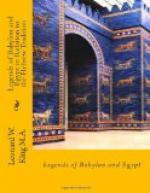mankind! their righteousness, saith the
Instead of causing a flood, Lord God. Let leopards(1) come and If I cause noisome beasts to diminish mankind! pass through the land, and Instead of causing a flood, they spoil it, so that it be Let famine be caused and let it desolate, that no man may pass smite the land! through because of the beasts; Instead of causing a flood, though these three men were in Let the Plague-god come and it, as I live, saith the Lord (slay) mankind! God, they shall deliver neither sons nor daughters; they only shall be delivered, but the land shall be desolate. Or if I bring a sword upon that land, and say, Sword, go through the land; so that I cut off from it man and beast; though these three men were in it, as I live, saith the Lord God, they shall deliver neither sons nor daughters, but they only shall be delivered themselves. Or if I send a pestilence into that land, and pour out my fury upon it in blood, to cut off from it man and beast; though Noah, Daniel, and Job, were in it, as I live, saith the Lord God, they shall deliver neither son nor daughter; they shall but deliver their own souls by their righteousness.
(1) Both Babylonian
words are in the singular, but probably
used collectively, as
is the case with their Hebrew
equivalent in Ezek.
xiv. 15.
It will be seen that, of the four kinds of divine punishment mentioned, three accurately correspond in both compositions. Famine and pestilence occur in both, while the lions and leopards of the Epic find an equivalent in “noisome beasts”. The sword is not referred to in the Epic, but as this had already threatened Jerusalem at the time of the prophecy’s utterance its inclusion by Ezekiel was inevitable. Moreover, the fact that Noah should be named in the refrain, as the first of the three proverbial examples of righteousness, shows that Ezekiel had the Deluge in his mind, and increases the significance of the underlying parallel between his argument and that of the Babylonian poet.(1) It may be added that Ezekiel has thrown his prophecy into poetical form, and the metre of the two passages in the Babylonian and Hebrew is, as Dr. Daiches points out, not dissimilar.




